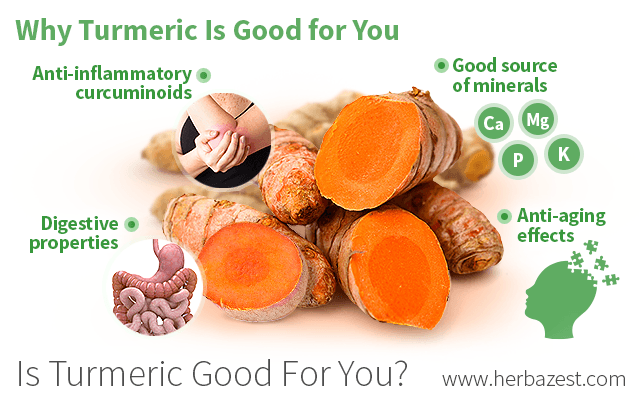Although it is most commonly used as a colorful food additive and dye, turmeric also possesses many other qualities that are good for health and nutrition.
Reasons Why Turmeric Is Good for You
As increasing scientific evidence proves turmeric's usefulness as a highly therapeutic herb, it has demonstrated its efficacy in the following ways:
Turmeric is rich in curcuminoids
A recent study took a closer look at the content of both fresh and stored turmeric rhizomes over a three-year period, discovering a 3 - 5% curcumin content, the pigment responsible for turmeric's distinctive golden color.
Curcumin works in conjunction with other curcuminoids to provide powerful antioxidant and anti-inflammatory relief that serves as the springboard for the majority of the therapeutic uses turmeric is good for.
CURCUMINOIDS NEUTRALIZE INFLAMMATION BY REGULATING THE ENZYMES AND COMPOUNDS THAT INHIBIT THE FORMATION OF INFLAMMATORY COMPOUNDS.
These benefits have earned turmeric a place among other important drugs and herbs used in the treatment of diseases such as arthritis, where turmeric eases joint pain and swelling by reducing inflammation as effectively as ibuprofen and with fewer side effects. Additionally, turmeric is good for you because it can help lower blood sugar levels and promote vascular health by relaxing the blood vessels, thus improving blood flow throughout the body.
Turmeric is a great digestive spice
Holding both carminative and choleretic properties, turmeric is good for your overall digestive health. A study published in 2016 demonstrates how good turmeric is for liver health.1 Its hepatoprotective activities include the capacity to induce bile acid excretion and improve bile flow from the liver. Moreover, another study has shown beneficial effects of turmeric and curcumin on human gut microbiota.2 Because of these properties, turmeric is sometimes compared to other digestive spices, such as cayenne, echinacea, anise, and garlic.
Turmeric is a good source of minerals
Turmeric contains a good amount of the key nutrients the human body requires. For example, ground turmeric spice contains approximately 168 mg of calcium, 208 mg of magnesium, 299 mg of phosphorus, and 2,080 mg of potassium per 100 g serving.
While both magnesium and potassium support nerve signaling and the formation of strong bones and teeth, calcium allows the blood vessels to contract and expand, while phosphorus helps with kidney function and protein formation.
Turmeric also provides almost half of the daily recommended intake of magnesium, an important nutrient good for the regulation of blood pressure and blood glucose levels. Meanwhile, potassium supports cardiovascular health by playing a role in transforming carbs into energy. Protein, carbohydrates, and dietary fiber are also present in turmeric.
Turmeric may have anti-aging properties
The anti-aging effect attributed to turmeric may be due to its antioxidant action, which promotes faster wound healing and protects against cellular damage. This helps to explain why researchers have taken a newfound interest in turmeric as a potentially good therapeutic treatment for Alzheimer's and dementia patients.
Research published in 1985 validated claims that the antioxidant benefits of turmeric are comparable to vitamins C and E, both of which also promote cellular repair and healing.3
Turmeric's safety for Alzheimer's management has also been suggested by a number of clinical trials. A behavioral study evaluating the effects of turmeric on three Alzheimer's patients witnessed an improvement in dementia symptoms - such as anxiety, irritability, agitation, incontinence, and apathy - after one year of treatment with turmeric capsules.4
While scientists have gathered that the anti-inflammatory and antioxidant healing properties of turmeric are responsible for the bulk of its health benefits, there is still a great deal left to be uncovered about its exact mechanisms of action, which could further explain the reasons why turmeric is good for you.
Sources
- Health Benefits of Turmeric - Curcumin for Cooking and Health
- International Research Journal of Pharmacy, Comparative studies on curcumin content in fresh and stored samples of turmeric rhizomes, 2011
- National Institutes of Health, Calcium | Magnesium | Potassium | Phosphorus
- National Library of Medicine, Phosphorus in the diet
- The Secret Benefits of Ginger and Turmeric
- USDA Nutrient Database, Spices, turmeric, ground
- The Herb Book, p. 148
Footnotes:
- Journal of Food Science. (2016). Choleretic activity of turmeric and its active ingredients. Retrieved October 26, 2016, from: https://pubmed.ncbi.nlm.nih.gov/27228476/
- Journal of Evidence-Based Integrative Medicine. (2018). Effects of Turmeric and Curcumin Dietary Supplementation on Human Gut Microbiota: A Double-Blind, Randomized, Placebo-Controlled Pilot Study. Retrieved October 22, 2021 from https://pubmed.ncbi.nlm.nih.gov/30088420/
- Chemical and Pharmaceutical Bulletin of Tokyo. (1985). Natural Antioxidants. III. Antioxidative components isolated from rhizome of Curcuma longa L. Retrieved October 26, 2016, from: https://www.jstage.jst.go.jp/article/cpb1958/33/4/33_4_1725/_pdf
- Ayu. (2012). An International Quarterly Journal of Research in Ayurveda, Effects of turmeric on Alzheimer's disease with behavioral and psychological symptoms of dementia. Retrieved October 26, 2016, from: https://www.ncbi.nlm.nih.gov/pmc/articles/PMC3665200/




